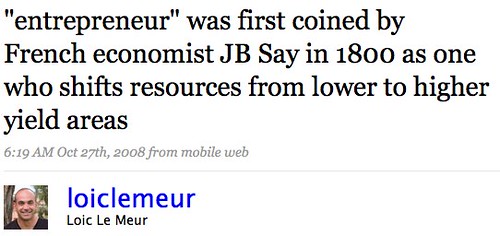Lachlan Hardy the other week was saying to Mick Liubinskas, myself, and others at the Sydney weekly Official Friday Drinks, that he doesn’t like “entrepreneurs” or at least people that call themselves that because he thinks it’s a silly term. We ended up having a lively debate and explored if there truly is value in an “entrepreneurs” degree. I thought I’d dig into what exactly an entrepreneur is because it’s an interesting term as Lachlan and the boys got me thinking.
I’ve had the label ‘entrepreneur’ slapped on me twice before without me even realising I was. The first time, I was 15 and lining up in the bank after school. The fat uniform shop lady from my school told me that she needed to get ahead of me, as she obviously had a lot more money to deposit over what she probably thought was me emptying out my piggy bank of $50 in coins. When it finally got to my turn, the bank teller remarked where did I manage to collect all that money (I think it was $5000). I told her I was organising my schools semi-formal, and I was collecting the ticket money. Just after I said that, the fat uniform shop lady waddled past me and quipped: “no – it’s because he’s an entrepreneur” and gave me a look and smile as if to say ‘you smart little bugger‘.
The second time I was called that was at work. In 2006 I pitched a proposal to have social media technologies implemented into the core operation of my rather large firm, which two years on, has successfully occurred. Early on, maybe six months into the roll-out, my home business unit (who would eventually use the technology but had no idea what I was doing behind the scenes in other parts of the firm) gave me an award in front of a few hundred people. As my skinny business unit leader described the story he said the “networking” award which I was being awarded is not appropriate, and instead should be regarded as an “entrepreneurs” award because that’s really what I am.
Weird eh? In the spirit of community, I organised a party for my school mates. Due to frustrations with my workflow, I attempted to make my workplace more efficient. Both those instances, were recognised as entrepreneurial. Fat lady called me an entrepreneur because I had a stack of cash in my hand; my stick-man boss’s boss called me an entrepreneur because I managed to convince senior management though contacts I developed to implement my idea.
What’s the common link?
What is this “Entrepreneur” that you speak of, sire?
According to WordNet, an entrepreneur is: “someone who organizes a business venture and assumes the risk for it“. Or the Oxford dictionary which states: “a person who sets up a business or businesses”.
This is very much in line with how people view the word – but there’s a problem with this definition. Let’s have a high-level look at the types of entrepreneurs.
There’s the glorified king of them all – ‘The Entrepreneur’ – who starts a business and then lists on the stock exchange or gets bought out for one-hundred million dollars and makes it as Times person of the year. WordNet and Oxford definition’s through and through.
A second type, the intrapreneur, is an entrepreneur stuck in a big company but displays the same traits as a ‘real’ entrepreneur. The defining difference being they don’t take the same risk of capital loss as their ‘real’ buddies. And correspondingly, don’t get the same rewards.
A third type, is the social entrepreneur like my friend Donnie Maclurcan who started up Project Australia. This is an emerging type, but when people hear about them there’s a bit of confusion. I mean, how does a non-profit venture yield, um, profit – isn’t that what entrepreneurialism is about?
All the above are entrepreneurial, but they don’t match the definition because of a misguided understanding: we are using money to measure it.
Entrepreneurialism is more like a combination of a risk-taker (different from gambler) and passionate expert, who generates value in our society. It’s almost like a function in our society – some people are conductors, others are saxophonists, and others play the violin. Different people pick their specialty: the violinists are playing music according to their function and develop accordingly; the conductors similarly according to their function. Extend the definition with people that love to be employees, and others that love to be managers. There is a different skill class required, and quite often, people in one class don’t want to be in the other (like how some computer developers who love their trade, get pulled away from their passion into management which they call admin). An entrepreneur, like an bridge engineer, is someones who’s flagged ‘I’m on the lookout to build structures of value’ except the former is building structures for markets as opposed to the latter who is building structures for transportation.
The traditional definitions we use are inconsistent. How can you describe something using such a one-dimensional view as finance when really what we are describing are components to a job function or perhaps even a type of labour class. They are almost like an artist, trying to perfect the synthesis of the four factors of production: land, labour, capital, enterprise. With the rise of the corporation as the dominant institution in our society, we’ve forgotten that our society was built by individuals who would otherwise be called an entrepreneur: sole traders selling to a market. We now group ourselves in a collective (a company) for the apparent ‘economies of scale’, as we can minimise our transaction costs.
Here’s an illustration with how the definition is at conflict with how we use it from the “risk” point of view. Most family businesses, like the local fruit-shop when they started, raised capital in the form of a bank loan. They very much are taking a risk there (the risk of bankruptcy) – but we probably don’t spare a moment in thinking the risk they took makes them “entrepreneurs”.
Contrast that to people innovating in technology. Typically a college kid comes up with a great new idea, and he then goes and raises funding from angel investors and then venture capital. What’s the risk there? If the venture fails, the money does not get enforced on the entrepreneur to be paid. People simply pack up shop with low heads and that’s it. In the upside, sure the entrepreneur needs to share profits. But if the only loss they face is the feeling of disappointment and perhaps, the $2 in capital they contributed to start the company, does this mean they are not entrepreneurs?
A better definition
This definition is from my favourite Frenchman, or at least, the guy that made me stop hating the French – and that’s saying something! (Greek waiters and French chefs do not work well under the same roof!)

Loic says it’s simply someone who moves resources from lower yield areas to higher yielding ones. The man that coined this was an admirer of Adam Smith’s “Wealth of Nations” but felt Smith underplayed the role of an entrepreneur in capitalism. So if you have a fan in your house cooling a room where no one is sitting, it’s moving that fan to the room where there are 20 people that are boiling hot due to the hot weather. It’s a person who has the initiative to reallocate a resource to where the demand and appreciation of that resource is. Bringing it back to economics, entrepreneurs are one of the major reasons our market economy works – and the market economy, despite it’s weaknesses in some areas, is a brilliant system at organising our society.
The WordNet definition is the typical interpretation of an entrepreneur in society, whilst the Loic interpretation is truer to the source of the word. Reconsidered in this light, I’ve now come to appreciate that as annoying entrepreneurs can be (it takes a certain kind- very much a me, me, me view on things; mavericks who upset the order – which sounds heroic but the reality is that they are a real pain in the arse; and the “shut-the-hell-up-Ive-already-heard-you-talk-about-that-idea-a-hundred-times” trait), we certainly shouldn’t diminish their role in society. And if someone identifies themselves as one, I would say they are simply flagging their place in the personality tree: don’t mock it, be aware of it.


